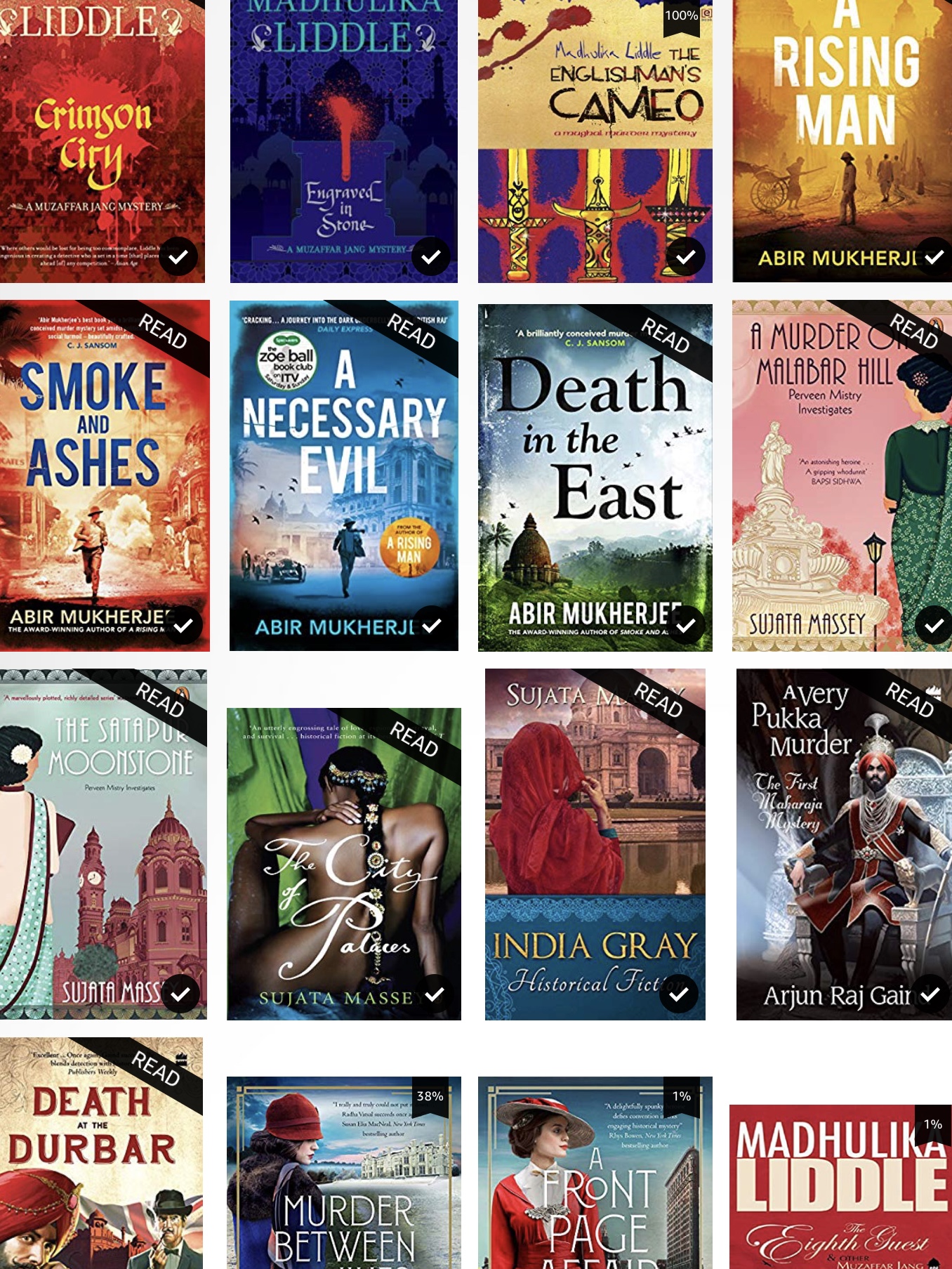June 24, 2020

Period piece Pleasures
By Nitin Desai

Trapped for months at home with nothing to do all day
By a virus that refuses to go away
I sought refuge in stories about tecs and spies.
Set back in time, with history in a new guise.
I begin this account of my lockdown reading of period piece thrillers with Madhulika Liddle whose three novels, An Englishman's Cameo, Engraved in Stone and Crimson City and a collection of stories, The Eighth Guest are set in Shahjahan's Delhi and have a local nobleman, Muzaffar Jung as the detective protagonist. Apart from the absorbing tale what is most entertaining is the depiction of life, particularly aristocratic life, in Mughal India, captured in the careful description of clothes, meals and even relationships. For someone who lives n Delhi and is familiar with Shahjehanabad her novels are quite a treat.
Fast forward to early twentieth century India. There are several novelists who have set their detective stories in this period when the freedom movement was taking roots in India. The most impressive is Abir Mukherjee, born and brought up in Scotland, whose first three novels, The Rising Man, A Necessary Evil and Smoke and Ashes are set in Kolkata of the 1920s and have as their detective protagonists, Sam Wyndham, an opium-addicted Scotsman who keeps going to opium dens in Kolkata's Chinatown in Tangra, and his Indian subordinate Surendranath Bannerjee who is referred to as Surrender-not! The roundedness of his two protagonists makes his novels absorbing. The fourth recent offering from the author, Death in the East, is set in Upper Assam where Sam Wyndham goes to an ashram to be cured of his addiction. Abir Mukherjee has worked in elements from the freedom struggle and the princely states into his narrative.
Sujata Massey's two detective novels, A Murder on Malabar Hill and The Satapur Moonstone, set in the early years of the twentieth century have as their detective protagonist a Parsi lady lawyer, Perveen Mistry. Actually the story of how Perveen Mistry ends up as a lawyer detective has a sociological tale behind it as she does it to escape exploitation in marriage into a very orthodox family. An interesting link that leads up to the two novels can be found in Massey's novella Outnumbered at Oxford that is part of her shorter fiction collection, India Gray. Massey's book about the murder on Malabar Hill includes interesting elements of Indian-British relationships in colonial India and an explanation of how Perveen Mistry becomes a detective because she is roped in to question a bunch of purdah clad women, A truly extraordinary tale is told in her book The City of Palaces that is not a detective novel but a story of a young orphan from rural Bengal who moves through extraordinary experiences to rise to a very different life in Kolkata. Sujata Massey has also written a series of detective novels set in modern Japan.
Yet another period piece detective novel writer is Arjun Raj Gaind whose two novels, A Very Pucca Murder and Death at the Durbar are set around 1910 and where the detective protagonist is Maharaja Sikander Singh ruler of a fictional princely state. Gaind's novels capture some of the tension between the princely rulers and the British but are rather simple in their storyline.
So far I have listed period-piece detective novels written by Indians and set in India. But there is one author of Indian origin, Radha Vatsal, who has set her detective novels in early twentieth-century New York. Her two novels, A Front Page Affair and Murder between the Lines, have as their lead a young girl Kitty Weekes. The novels are quite captivating in the way in which they present the ambience of upper class New York and how a young girl gets caught in situations that force her to become a detective.
Robert Harris is rather different. In his novels the link with history is not just to establish a period ambience for the story. Historical events and personalities are an integral part of his narrative as in Munich, which is about the Chamberlain Hitler meeting, or An Officer and a Spy, about the Dreyfus affair, or Enigma about the wartime code breaking centre at Bletchley Park. Harris is a prolific writer and has produced much more by way historical fiction including one book Fatherland about what if Hitler had won. An acolyte of Harris's Rory Clements has written a couple of books, Nucleus and Corpus which are of the same genre though he is better known for his detective novels set in sixteenth century Elizabethan England with John Shakespeare, William Shakespeare's elder brother, as the protagonist.
Besides these period piece novels several other thriller writers whose novels are set in contemporary times, kept me entertained. The great Stieg Larson and David Lagercrantz who has followed up with further tales about the strange protagonist Lisbeth Salander, Stella Rimington, who used to head MI5, the UK's internal security unit and the truly extraordinary Japanese writer Keigo Higashino whose detective novels are crisp, truly suspenseful and with well delineated characters.
Thrillers set back in time enthral and entertain
And make no demands on your conscience or brain
Because we all have a surplus of time to lose
Relax, read them and get rid of your lockdown blues.